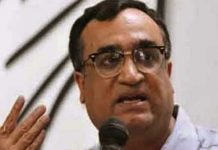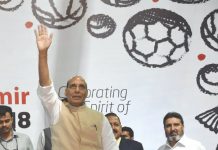 Legendary American whistleblower Edward Snowden had reacted in the wake of registration of a police case against The Tribune reporter Rachna Khaira for her investigative story exposing chinks in India’s Aadhaar system, saying such journalists actually deserve an award and not punishment.
Legendary American whistleblower Edward Snowden had reacted in the wake of registration of a police case against The Tribune reporter Rachna Khaira for her investigative story exposing chinks in India’s Aadhaar system, saying such journalists actually deserve an award and not punishment.
Following it up though not necessarily on Snowden’s nudging, Harish Khare, the Editor-in-Chief of her employer organization befittingly awarded her a cash prize of 50,000 for the story which shook the Indian establishment and caused ripples worldwide especially in the media. This gesture by Khare in his personal capacity even before his organization could come up with the idea is surely commendable and it came forth because Rachna worked hard to earn it.
This monetary reward is not a one-time inspiration. Naming it as Editor’s Choice, Khare declared in an in-house communication that he has decided to institute this cash award for the best story matching his expectations. Khaira is not only its first recipient, she has also become the inspiration for instituting this best story award at The Tribune.
Only a few years-old in the profession and she has become a trend-setter, a huge source of motivation for others with as little experience as her. Khaira joined The Tribune as a stringer in 2013 at Jalandhar and rose to the position of senior staff correspondent when taken on regular payrolls. Before this, she had worked for nearly 5-6 years as a field reporter in other organizations including a news agency.
A few minutes into a conversation with her is enough to get an idea of the stuff this go-getter journalist is made up of. She is so full of energy that hardly leaves one unimpressed about her untiring zeal to work. No bit of information is insignificant for her. Unafraid of taking on challenges and her penchant to dig out information is what makes her temperamentally fit for an investigative reporter’s job. “I am not at all scared of the FIR filed against me in Aadhaar data leak story because I knew I did nothing wrong,” she said.
It is not the first time that this Delhi University graduate has done an incisive piece of journalism. In 2016, she exposed violations of adoption procedures under the Juvenile Justice (Care and Protection of Child) Act, 2000. All assignments, even if it is removal of a few local encroachments in her city, are important for her, she said. It is a measure of her passion for work.
How does she feel having gained overnight national and international acclaim as a journalist in a somewhat unusually short career span? “I simply did a story as part of my daily work. But yes, I never expected it would
get such large scale recognition though I was aware it was something sensitive I was working on,” she said. Her equation with colleagues is as it was earlier even after acquiring, as one may put it, a kind of celebrity-journalist status. Probably, this is her nature — unruffled, cool and unpretentious. And which is why her responses are uncalculated, clear and honest.
“Public and national interest is what occupies my mind whenever I do a story,” said this first generation journalist in her family. She, in fact, obtained a degree in mass communication to join the Army. But she was destined to pursue journalism as a career and marry into a family of Army officers. “I can say I stumbled into the field of active journalism,” she summed up.
letters@tehelka.com













